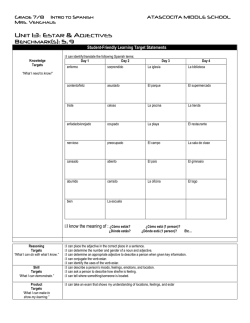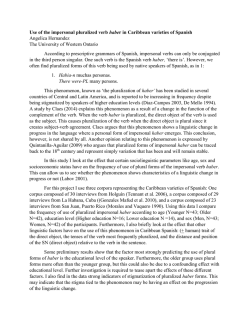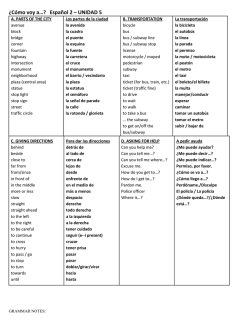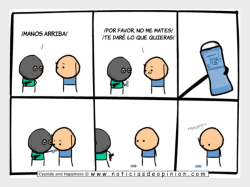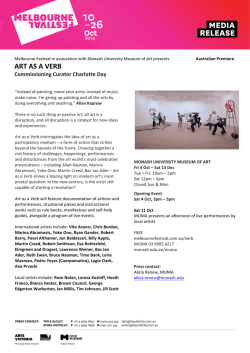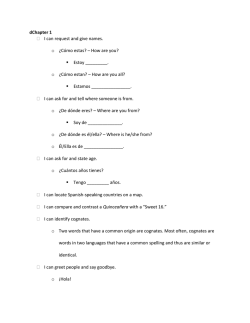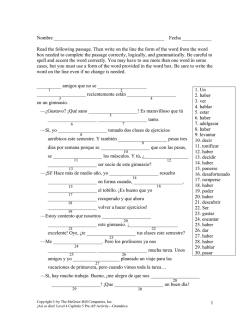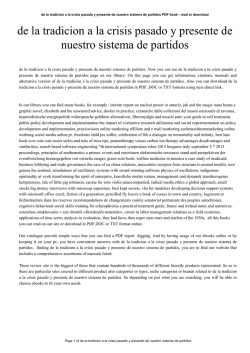
Sheet1 Verbos de Indicativos
Sheet1 Verbos de Indicativos Pretérito Progressivo Past Progressive Pluscuamperperfecto Pluperfect / Past Perfect Pretérito Perfecto Compuesto Present Perfect Participo Pasado Past Participle Pretérito Imperfecto Imperfect Tense Formed with the verb Estar in the Imperfect or Preterite + Gerund. An action that was in progress but completed when interrupted. Formed with the verb Haber in Imperfect Tense + Past Participle. An action that took place prior to something else. Formed with the verb Haber in Present Tense + Past Participle. Something that was true in the past and is still true, an action that was completed recently, a scope of time stated or implied which includes the present. Similar to English words that end in -ed. Actions in the past, repeatedly or for an extended period of time, narrations, descriptions. Explaining physical, mental, emotional with creer, saber, pensar, ser, tener, etc. Estaban estudiando cuando llamaste. They were studying when you called. Estar + Gerundio Yo Estuve/Estaba estudiando Tú Estuviste/Estabas creyendo Él/Ella/Ud. Estuvo/Estaba viniendo Nostros Estuvimos/Estábamos negando Ellos/Uds. Estuvieron/Estaban buscando * Antes, Ya, Anteriormente, etc. Habíamos comido antes de ir a la escula. We had eaten before going to school. Haber (Imperfecto) + Participo Pasado Había continuado Habías entendido Había pedido Habíamos matado Habían cabido Él no ha comido en ese restaurante. He has not eaten in that restaurant. Haber (Presente) + Participo Pasado He entrado Has compuesto Ha herido Hemos indicado Han comido -AR verbs replace with -ado -ER verbs replace with -ido When used as an adjective, it must match gender and number of noun, with a verb it always ends in -o. Estoy abierto la puerta. I opened the door. Terminado Vendido Recibido Tocado Crecido Sacado Abierto Cubierto Roto Dicho Puesto Visto * Cuando, Mientras Tú escribías libros muy interesantes. You used to write very interesting books. -AR Verbos aba abas aba ábamos aban -ER/IR Verbs Ía ías ía íamos ían Pretérito PreteriteTense, Simple Past Presente Simple Present Presente Participo (Gerundio) Present Participle (Gerunds) Presente Progresivo Present Progressive Futuro Perifrástico Future (Going to) Past actions in a fixed endpoint in time, specific number of times, enclosed amount of time. Actions taking place in this moment. Absolute and general truths. Actions taking place in the near future. Formed with the Verb Base + ando (-AR) or iendo (-ER/IR) Ir (conjugated) + a + Infinitive. When an action is to occur in the near future, expression of time. Compré una camisa. I bought a shirt. Formed with the verb Estar in the Present Tense + Present Participle. Used to place an emphasis on the continuing nature of an action. Yo camino I walk - I am walking - I do walk Yo Tú Él/Ella/Ud. Nostros Ellos/Uds. Similar to adding -ing to a word in English. -AR Verbos é aste ó amos aron -ER/-IR í iste ió imos ieron -AR o as a amos an -ER o es e emos en -IR o es e imos en Verb Base + ando or iendo Caminando Walking Ofreciendo Offering Bullendo Boiling Continuando Continuing Revolviendo Revolving Estás hablando con ella. You are talking with her. Estar + Presente Participo Estoy pagando Estás pudiendo Está olvidando Estamos pasado Están obteniendo Van a ir al banco pronto. They are going to the bank soon. Ir + a + Infinitivo Voy a regresar mañana Vas a comer esta noche Va a Ir la semana próxima Vamos a caminar esta tarde Van a beber en un hora Futuro Simple Simple Future Futuro Progresivo Future Progressive Futuro Perfecto Future Perfect Modo Imperativo The Imperative Presente de Subjuntivo Present Subjective Formed with the Infinitive + Verb Ending. Actions that take place in the future. Formed with the verb Estar in the Future Tense + Gerund. Similar to will be + -ing. Used to expresses an action that will be in progress at the moment in question. Formed with the auxiliary verb Haber Conjugated in the Future tense + Past Participle. Expresses action that will have taken place, probability or supposition about events. Direct statements used for giving a command now. Something not known or controllable, Desire, Ignorance, Opinion, Uncompleted Action, Maybe / Perhaps, "Even If". Nosotros ayudaremos mañana. We will help tomorrow. Próxima semana, estaremos caminando en San Jose. Next week, we will be walking in San Jose. ¿Se habrá olvidado Mariá? Could José have forgotten? Dime un cuento. Tell me a story. * Remove "yo stem" in present tense.. Ojalá que no llueva manaña. I hope it doesn't rain tomorrow. No le babas. Don't drink it -AR/-ER/-IR Verbos Estar (Futuro) + Gerunidio Haber (Futuro) + Participo Pasado -AR Verbos -ER/-IR Verbos -AR Verbos Yo é Estaré errando Habré entrado - - e a Tú ás Estarás obedeciendo Habrás compuesto e (+) as (-) es as Él/Ella/Ud. ás Estará recibiendo Habrá Ido e a e a amos emos amos an en an a (+) es (-) Nostros emos Estaremos rogando Habremos llevado emos Ellos/Uds. án Estarán vendiendo Habrán querido en -ER/-IR
© Copyright 2026
